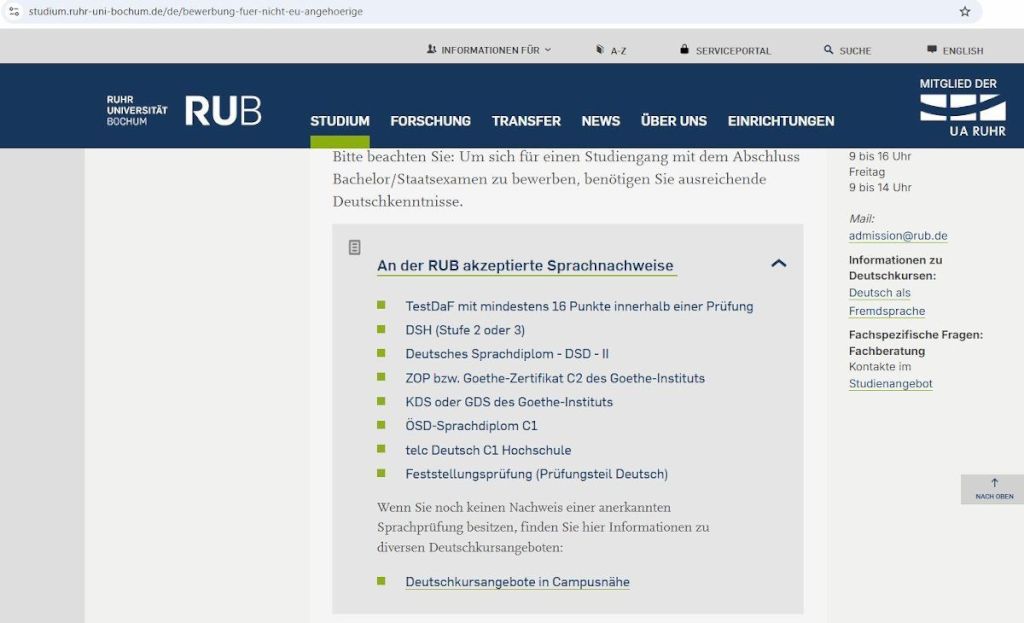You want to enter a German university as soon as possible, but you are not sure which German exam to take? This is a common situation for applicants. In this article, you will learn where to start, how to choose the right exam, and what to pay attention to in order to make the best decision.
University Website
Yes, this is exactly where you should begin. If you do not have a C2 certificate, you need to check the admission requirements for international students at your chosen university.
Visit the official website of the university and find the section for international students. Your search query could look like this:
«[University Name] ausländische Studierende Voraussetzungen»
The relevant section is usually called «Bewerbung und Zulassung» or «Sprachkenntnisse». There you will typically find a list of accepted language certificates. For example, this is how it looks on the website of Ruhr University Bochum:

Freedom to Choose a University
If you want to increase your chances and make sure that you choose the university – not the other way around – you should take the German exam at the highest level possible. Which exams are accepted by all universities?
- Goethe-Zertifikat C2
The highest level of German proficiency, granting access to all universities. However, this exam is extremely challenging. You can live in Germany for years and speak German daily, but that does not automatically mean you will pass. So, let’s look at more realistic options.
- DSH
This is a university-based exam. Its difficulty lies in the fact that it is not standardized – each university conducts its own version. This means you have to travel to the specific city and university where you want to study, and it is hard to prepare because the formats vary widely.
- TestDaF
This is the most convenient option for international applicants. You can take it in your home country, and the results are accepted by all universities in Germany and other German-speaking countries. The exam evaluates levels from B2 to C1, and achieving TDN 4 is sufficient for admission everywhere.
Read more about the TestDaF scoring system in this article. Information about the two TestDaF formats (paper-based and digital) can be found here.
TestDaF is the only universal exam that can be taken in your home country and is accepted by all universities. The next step is careful planning.
How to Improve Your Admission Chances and Academic Success
- Learn the language thoroughly.
It’s not enough just to get admitted – you also have to study in German. Understanding and using the language confidently can be crucial for your academic success. Note that many universities do not list the Goethe-Zertifikat C1 among accepted certificates. This is not because it’s easier – in fact, it’s often harder than TestDaF, as it requires nearly perfect grammar. However, it’s more “linguistic” than “academic.”
The Goethe-Zertifikat C1 tests general language competence, while TestDaF assesses academic readiness.
Although both confirm the same C1 level, the question remains whether you can use the language in a specific academic or professional field. Therefore, view exams not as a finish line, but as a foundation on which you will build your academic and professional future.
- Choose the most universal exam and plan your time.
Allow enough time for preparation, practicing exam formats, registration, and possible retakes. Anything can happen on exam day – from delays to illness. So it’s wise to plan for the possibility of a second attempt.
To avoid surprises, take a few mock tests – it will boost your confidence. On this website, you can practice the digital TestDaF under realistic conditions, receive a preliminary evaluation and feedback from a teacher. This is the ideal way to achieve success.
Each exam has its own format and strategy. Even if your German is strong, an unfamiliar task type can affect your result. On this page, you will find video courses focused on each section of the digital TestDaF exam — entirely in German, to improve your language comprehension and fluency.
- Apply to multiple universities.
Use the uni-assist.de platform, which centrally processes international applications. It allows you to submit your documents to several universities at once with minimal effort.
Conclusion
Your success in gaining admission to a German university depends not only on your language level but also on your strategy. Start by checking university requirements, choose the universal TestDaF exam, and plan your preparation carefully — then you will choose the university, not the other way around.
Remember: the exam is not the end of the journey — it’s the beginning.



